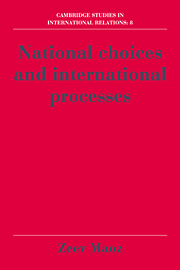Book contents
- Frontmatter
- Contents
- List of figures
- List of tables
- Preface
- 1 Toward a theory of international processes
- 2 Foreign policy decision making: assumptions and characterization of the approach
- 3 The inputs of decision making: identification and conceptualization
- 4 The essential mathematics of inputs
- 5 Models of the decision process
- 6 A formal characterization of decision processes
- 7 A theory of foreign policy decision making
- 8 The analysis of international outcomes
- 9 The evolution of international processes
- 10 Individual preferences, national choices, and international systems
- References
- Name Index
- Subject Index
7 - A theory of foreign policy decision making
Published online by Cambridge University Press: 05 February 2012
- Frontmatter
- Contents
- List of figures
- List of tables
- Preface
- 1 Toward a theory of international processes
- 2 Foreign policy decision making: assumptions and characterization of the approach
- 3 The inputs of decision making: identification and conceptualization
- 4 The essential mathematics of inputs
- 5 Models of the decision process
- 6 A formal characterization of decision processes
- 7 A theory of foreign policy decision making
- 8 The analysis of international outcomes
- 9 The evolution of international processes
- 10 Individual preferences, national choices, and international systems
- References
- Name Index
- Subject Index
Summary
INTRODUCTION
Having reviewed the major concepts, theoretical approaches, and empirical findings of this field, we are now in a position to integrate them into a general theory which attempts to address three fundamental issues: (1) What are the factors that influence the procedures and substantive contents of individual decision making processes in foreign policy settings? (2) What is the relationship between individual preferences and collective choice processes in such settings? (3) What are the political and other characteristics of foreign policy groups and how do these characteristics influence the processes of collective choices on foreign affairs? The fundamental premise of this analysis is that the knowledge available to date on foreign policy decision making – both of the propositions that have received some empirical support and the propositions that have not yet been subjected to empirical tests – forms a sufficient basis for a general theory of foreign policy decision making.
The theory presented in this chapter is abstract, and the extent to which its propositions conform with reality is beyond the scope of the present study. Nonetheless, since none of the elements of the theory is novel (in the sense that they represent original ideas which are in some way different from those presented in previous research), it is possible to present some preliminary evidence for the plausibility of the various propositions by using studies of decision making that have been reviewed in previous chapters.
- Type
- Chapter
- Information
- National Choices and International Processes , pp. 304 - 377Publisher: Cambridge University PressPrint publication year: 1990

